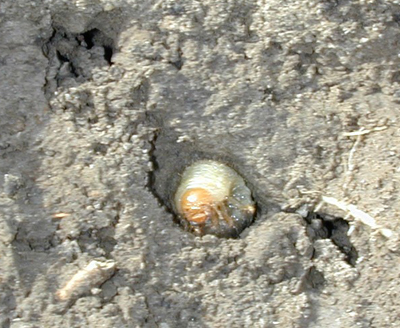
- Cold winters often have people wondering how long periods of sub-zero temperatures may impact insect survival.
- Insect have many strategies for avoiding lethal effects of cold temperatures.
- Most Midwestern pests are well adapted to our winters.
- Although long periods of subzero temperatures can affect insect survival, winter temperatures that fluctuate widely is hardest on insects.
Every year, people like to speculate on the effects the winter weather has had on insect survival. This year, the bitter, cold winds of January and snow cover have prompted more than the usual number of questions. So, let’s pose the question again: “What has the winter weather done to the crop insect pests?” The short answer is: “Probably not much.” It’s actually a little more complicated than that, so let’s consider the many survival factors.
Insects have many strategies for avoiding lethal effects of cold temperatures. Prediction of overwintering success of field crop pests is extremely difficult because of the large number of variables involved with these strategies. Following are some brief, general comments and observations concerning pest insect overwintering.
Migration: Some insects are poorly equipped to withstand winter cold temperatures, so they avoid the cold by migrating to warmer areas. Black cutworm, fall armyworm, true armyworm, and potato leafhopper are all migrants.
Shelter: A number of our native insect species survive winter’s cold by seeking adequate shelter. This usually means fencerows and woodlots, or more commonly within or under crop residue. Corn flea beetles and bean leaf beetles are in this group. Some insects use the depths of the soil to obtain winter shelter. White grubs, wireworms and grape colaspis all seek protection in the depths of the soil. Corn rootworm beetles will deposit eggs from 2 to 18 inches deep, or more, in the soil.
Developmental Stage: Many insects overwinter in the developmental stage that is most tolerant of winter conditions. Corn rootworms, soybean aphids, several grasshopper species, and some alfalfa weevils overwinter as eggs. White grubs and some cutworm larvae overwinter deep in the soil. Certain insects, like European corn borer larvae, can only overwinter as 5th instar larvae.
Supercooling: Many insects have the ability to purge their systems of food and bacteria that can serve as ice nucleation source points. In addition, by accumulating sugars or glycerol in their blood, they can effectively lower the temperature at which they freeze. Our knowledge of pest insects and their habits suggest that the corn flea beetle, bean leaf beetles, and alfalfa weevils are included.
Tolerance to Freezing: Some insects not only have the ability to supercool, but also have a high tolerance to freezing. These insects typically allow decreasing temperatures to further dehydrate cells and the insects can also physiologically limit the formation of ice crystals to spaces between cells. This exclusion of ice crystals from within cells effectively prevents tissue injury from ice formation. The European corn borer is one of the species noted for its tolerance of cold winter weather.
Summary: Most Midwestern pest insects are well adapted to our winters. However, we expect that this winter could have adversely affected populations of Japanese beetles, bean leaf beetles, and corn flea beetles. Japanese beetle grubs tend to be intolerant of temperatures below freezing at soil depths where they overwinter. There has also been speculation that hard freeze could have penetrated deeply enough into the soil to impact overwintering eggs of western corn rootworms. (Northern corn rootworms tend to be more tolerant of cold conditions.) Survival of corn flea beetles is known to decrease with cold winters, and bean leaf beetles’ winter survival often depends on the amount of shelter or residue cover where the beetles are spending the winter.
Here is a fact that tends to surprise most people: The winter weather that is hardest on insects includes wet weather, and mild (or unusually warm) winter temperatures that fluctuate widely. We did experience some winter temperature fluctuations this season but we should not count on winter weather to cause significant pest insect population reductions.
Image: Japanese Beetle Grub in Cell in Soil